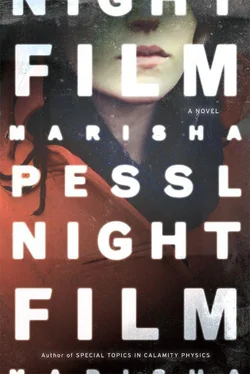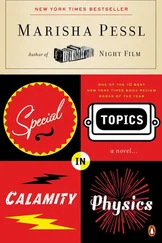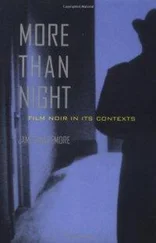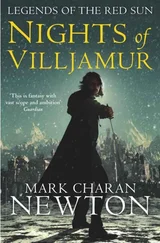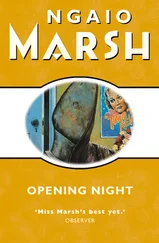As she said this, a phone began to bleat on her end, though she ignored it.
“The dark side of life has a way of finding us all anyway, so stop chasing it.”
“Thank you, Sharon. For everything.”
“Forget it. Now, would you go to the beach, get a girlfriend, a tan, something ?”
“Sure.”
“Take care.”
“You, too.”
The line went dead. A black bear’s foot.
I went about the rest of my day, trying to get my mind off the sheer disappointment, telling myself to accept it, that Hopper and Nora were right. I’d come to the end of the road. And found an undeniable dead end. There was no evidence of any crime.
But then, I realized, there was one last stone to turn over. There was one person left who might shed light on the situation, who could explain from an insider’s point of view what it all meant — and that person was Cordova’s longtime assistant, Inez Gallo.
I needed only to wait for her to return to the townhouse. I’d wait as long as it took. And when that woman finally appeared — whether it was tomorrow or three years from now — I’d be ready.
It happened the twelfth day I’d been watching. Just after five o’clock in the evening, I was returning from a deli on Lex when I noticed a petite woman in a black coat walking swiftly down the sidewalk, half a block in front of me.
It was Inez Gallo. I recognized her immediately: the hastily cropped gray hair, hunched, stalwart bearing like a tiny bull poised to charge. As if she didn’t want to be seen, she hurried up the steps, disappearing inside.
I waited for a few minutes, and when the street remained deserted, I grabbed the wrought-iron grate spanning the townhouse’s first-floor window and began to climb. I needed Gallo off her guard, and I remembered how Hopper had done it: wedging his feet between the bars, bracing his right foot on the old-fashioned lamp over the front door. Seizing the latticed railing along the second floor high over my head, I managed to hoist myself up to the balcony, hooking my right leg over the side, climbing up, and collapsing onto the leaf-strewn floor. I headed to the window on the right, the one that Ashley had disabled from the house alarm.
Gallo had turned on quite a few lights in the entrance hall below, because light was shining through the doorway opposite, allowing me to see. It was an ornate wood-paneled library, every piece of furniture covered in white sheets. It was empty.
I took out a credit card, wedged it under the window’s sash, lifting it just enough to get my fingers underneath, slid it open, and climbed inside.
Hopper had said, the night he’d broken in, that the townhouse looked frozen in time. He found every object to be sitting precisely where it’d been seven years before — the day Ashley and he were due to leave for Brazil and she’d stood him up. Same exact sheets tossed randomly over the furniture, he’d said, the same Chopin music on Ashley’s piano. Now everything was meticulously covered and put away; when I lifted the sheet over the massive Steinway, positioned in the far corner by the bookshelves, there was no music. It seemed to me someone — Inez Gallo, perhaps — had packed up the house more carefully now, maybe as a result of Hopper breaking in. Or else the family had asked her to do it after Ashley’s body had been found.
There was an armchair facing the library’s entrance, which overlooked the lit-up landing and a spiral staircase. I sat down, waiting, and within minutes I could hear footsteps rapidly coming up the steps.
Suddenly, there she was — Inez Gallo, in baggy gray wool slacks and a white blouse, hurrying across the landing, headed for the next flight.
“Miss Gallo.”
She froze, stunned, and whipped around, staring in at me, though probably couldn’t see much beyond my silhouette.
“Or do you prefer to be called Coyote ?”
She lurched furiously to the doorway, sliding her hand over a light switch, and suddenly the library was bathed in dim gold light from the overhead lamp.
When she saw me, she sized me up with enough scorn for me to know she knew precisely who I was.
“Sorry to drop in like this.”
“You people just can’t take a hint. I hope you like sleeping in jail.” It was a deep, throaty voice, which sounded better suited for a truck driver or a six-foot bouncer, not such a hefty yet diminutive woman. She was barely five feet but shaped like a cinder block. She strode into the library and snatched a cordless phone off the counter, started to dial.
“I wouldn’t do that.”
“No?”
“ Coyote is an intriguing nickname. Personally, I’d have wanted my term of endearment to be a little less incriminating. Human trafficking for forced labor? My friend at ICE tells me there used to be quite a racket originating from your hometown. Puebla, isn’t it? Apparently, a mysterious woman arrived in an empty minivan once a year and left with it chock-full of people —stacked in the back like firewood. I’ve spoken to a few. They gave a startling description of the woman behind the wheel. The punishment per offense is a minimum of three to seven years. How many films did they work up there? Ten? That’s thirty to seventy years. After The Peak, I expect federal prison will be quite a culture shock.”
As I said this, I’d been watching Gallo’s face. The second I’d said human trafficking, I knew I’d hit the bull’s-eye.
And thank Christ —because I was bluffing: I had no friend at the ICE, and not a single witness. For the last few days, I’d pored over my hastily rewritten notes, trying to nail down something, anything, to use against Gallo. I kept returning to her nickname, mentioned by both Peg Martin and Marlowe Hughes: Coyote. A coyote was a wild prairie dog, but it was also slang for anyone who escorts illegal aliens over the Mexican-U.S. border. They could range from makeshift mom-and-pop organizations to those sponsored by billion-dollar drug cartels.
Peg Martin had specifically mentioned the film crew had used the nickname, and thus I wondered if it was because Gallo had been their actual coyote. That, combined with her birthplace in Mexico and Marlowe’s assertion that Gallo did Cordova’s dirty work, I made the theoretical leap that it just might be Gallo who had transported all of the illegal aliens to The Peak. The arrangement probably was that they worked crew on his film for three months, witnessing any number of appalling acts, and then, after being sufficiently threatened so they’d never spill the beans, were free to go. It was unquestionably a long shot, and I hadn’t expected it to work — until now, when I’d watched the color drain out of Gallo’s face.
She’d transformed considerably in the years since her bright-eyed teenage wedding photo — even since the day she’d accepted Cordova’s Academy Award for Thumbscrew. It was as if all those decades serving the director, standing in such close proximity to him, had petrified her, made her gray hair grow coarser and wirier, her low brow heavier, her lips tighten as pulled string. There seemed nothing left in her that was light or carefree. But perhaps that was what happened when one decided to forever orbit a hulking planet with a mass that dwarfed one’s own.
She hadn’t moved a muscle, only watched me intently. She put down the phone.
“What do you want, Mr. McGrath?”
“To have a heart-to-heart.”
“We’ve nothing to discuss.”
“I disagree. We can start with Ashley Cordova being dead at twenty-four, then I have another problem, the fact that everyone I’ve talked to about Ashley has gone missing, including a man’s house burned to the ground. If you talk to me, maybe my friend at ICE will let slide your slave-labor operation.”
Читать дальше
